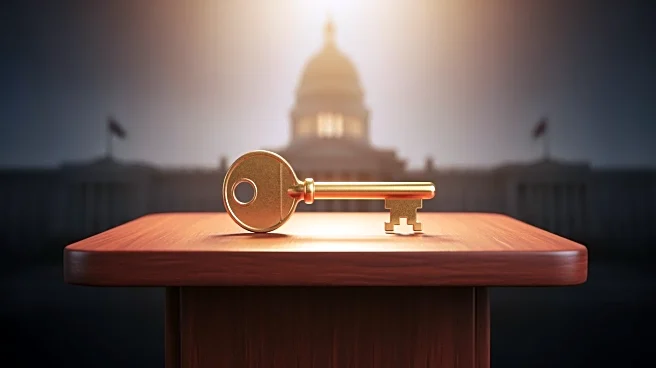What's Happening?
The government shutdown has reached its 37th day, with President Trump urging Republicans to end it by eliminating the Senate filibuster. Despite some Democrats showing interest in resolving the shutdown, recent election victories have strengthened their
resolve to maintain their stance. President Trump acknowledged that the shutdown negatively impacted Republicans during the elections. While most Republicans are not in favor of removing the filibuster, bipartisan discussions have gained momentum, potentially leading to a short-term funding measure and votes on regular appropriations bills. However, expiring healthcare subsidies remain a contentious issue in these talks.
Why It's Important?
The prolonged government shutdown has significant implications for U.S. politics and public policy. It affects federal operations and services, potentially leading to economic disruptions and public dissatisfaction. The debate over the filibuster highlights the ongoing struggle between legislative efficiency and minority rights in the Senate. If resolved, the shutdown could lead to temporary relief for affected government employees and services. However, the underlying issues, such as healthcare subsidies, continue to pose challenges for bipartisan cooperation. The situation underscores the complexities of governance and the impact of political strategies on public welfare.
What's Next?
If bipartisan talks succeed, a short-term funding measure could temporarily reopen the government, providing relief to federal employees and restoring services. However, the resolution of healthcare subsidies remains uncertain, potentially affecting future negotiations. The Supreme Court's pending decision on Trump's tariffs could also influence economic policies and international trade relations. Stakeholders, including political leaders and civil society groups, are likely to react to these developments, shaping the political landscape and public discourse. The outcome of these discussions and rulings will have lasting effects on U.S. governance and policy-making.
Beyond the Headlines
The government shutdown and filibuster debate reflect broader issues of political polarization and legislative gridlock in the U.S. The situation raises ethical questions about the balance between political strategy and public service. Long-term implications include potential shifts in legislative practices and public trust in government institutions. The Supreme Court's decision on tariffs could redefine executive powers and international trade policies, impacting economic stakeholders and global relations. These developments highlight the interconnectedness of political, economic, and social factors in shaping the future of U.S. governance.

















